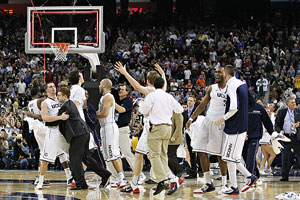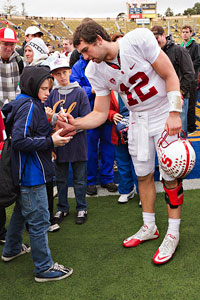By Ian R. Rapoport |

Photo by Ted Fitzgerald
He came alive yesterday.
In a training camp opening day no one will forget, the Patriots coach once again turned all eyes on his team by trading for former Pro Bowl players Albert Haynesworth and Chad Ochocinco.
Suddenly, thanks to the addition of the former Redskins defensive tackle and the ex-Bengals wide receiver, the Patriots received a jolt of energy and expertise deemed necessary by Belichick even after a 14-2 season. And the world noticed, with the Pats dominating the headlines, beginning when the Haynesworth deal broke before 6:20 a.m. By 7 p.m., Ochocinco was trending worldwide on Twitter.
While neither trade has been made official, Ochocinco said in a tweet, “God is so Good” after the news broke. Both players headed to the facility last night to meet with Belichick, a coach Ochocinco called “a friend” in 2010.
Suddenly, Trader Bill was back. Belichick left players shaking their heads in awe, aware that their world was quickly changing.
“It’s huge,” defensive end Ty Warren [stats] said of Haynesworth’s trade. “I mean, he’s got some freakish ability.”
When Belichick addressed the media, he acknowledged a deal for Haynesworth was in the works but cautioned it wasn’t done yet. By late last night, it was.
Ochocinco has been a character off the field, whether starring in a television show, emerging as a national brand on Twitter or trying his hand at riding a bull. And he’s no longer young at age 33.
Haynesworth, 30, has battled character concerns for years, from stomping on an opponent to several arrests to refusing to play in the Redskins’ base defense.
Both are talented. Both have question marks. For any trade, Belichick does the research.
“Anytime you acquire a player, however you do it, you want to be comfortable putting that player into your team,” Belichick said. “So whether you draft them, sign them, trade for them, however you do it, that’s what you want to try to do.”
The Ochocinco deal was in the works for days, with the 49ers, Raiders and Patriots having permission to trade for him. The Patriots won out, and Ochocinco had final say.
Of course, this is not unprecedented. The Patriots have taken on erstwhile reclamation projects, disgruntled talents and players with poor reputations before. The success stories of Randy Moss and Corey Dillon [stats] stand out.
Perhaps adding two low-risk high-reward question marks is a sign that Belichick is comfortable with his locker room, even though he said when asked, “I have no idea. This team is a new team.”
“If you’re here, we’ll welcome you with open arms,” nose tackle Vince Wilfork [stats] said. “We always want to be on the same page no matter how you slice it. When you step on the field you have to be on the same page or that’s where mistakes happen.”
To make the deals happen, it doesn’t look like Belichick mortgaged the future. Haynesworth, who will earn a non-guaranteed salary of $5.4 million this season, came over for a fifth-round pick in 2013. The team will try to motivate him.
Ochocinco was reportedly traded for two future late-round picks and restructured his contract into a three-year deal. He will still earn $6 million in 2011, ProFootballTalk.com reported, after just 67 catches for 831 yards last year.
What the Patriots will get remains to be seen. But both Ochocinco and Haynesworth figure to be ecstatic, and a good fit, on their new homes.
The Patriots need pass-rush help, and Haynesworth (51 tackles, 81⁄2 sacks in 2008) providing a push up the middle should assist everyone. Still, one veteran executive familiar with Haynesworth described him as a player “who can dominate when motivated but can quit instantly.”
As was clear in the playoff loss to the Jets, the Patriots need help from an outside receiver. That’s what Ochocinco brings, averaging more than 10 yards per catch each year of his career. He’s just, well, different.
“I think he’d be fine,” receiver Wes Welker said this summer. “I think he’s pretty harmless. He does all the extra stuff that Bill is not too fond of. It’s never anything too bad.”
Article URL: http://bostonherald.com/sports/football/patriots/view.bg?articleid=1354863







